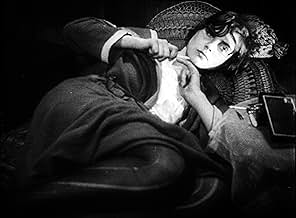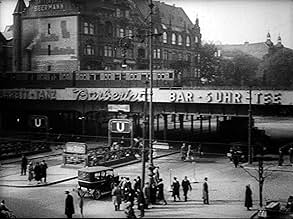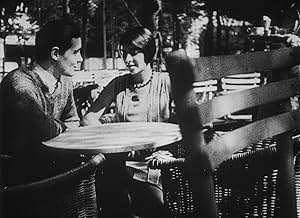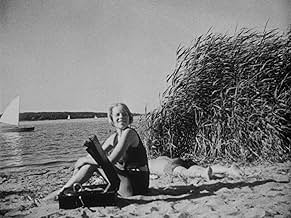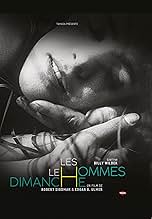PUNTUACIÓN EN IMDb
7,3/10
3,8 mil
TU PUNTUACIÓN
Dos hombres y dos mujeres disfrutan de un agradable domingo en la playa al final de una ardua semana de trabajo.Dos hombres y dos mujeres disfrutan de un agradable domingo en la playa al final de una ardua semana de trabajo.Dos hombres y dos mujeres disfrutan de un agradable domingo en la playa al final de una ardua semana de trabajo.
Kurt Gerron
- Self
- (sin acreditar)
Valeska Gert
- Self
- (sin acreditar)
Heinrich Gretler
- Self
- (sin acreditar)
Moriz Seeler
- Photo Subject at Beach
- (sin acreditar)
Ernö Verebes
- Self
- (sin acreditar)
Reseñas destacadas
One of the surprising things about this film is the very acute, naturalistic and fundamentally humorous performances from an amateur cast, lacking all the usual strange, exaggerated mannerisms of silent cinema. The other impressive aspect of the film is the beauty of the photography, always playful and probing: the scene where an old man responds to the pompous nationalistic statues in the park is brilliant and affecting, if rather ambiguous. The modern score that was provided in the version I saw was effective and fitting: to be recommended. I agree that it all seems rather unreal, given that it takes place in 1929- yet it strikes me as not so much realistic, as naturalistic: perhaps striving to depict normality in difficult times. A very good and fundamentally humane film, lacking any real plot or suspense, but full of really interesting moments.
In France ,Marcel Carné released his first film ,a short ,at about the same time:it was called "Nogent ou l'Eldorado du Dimanche" and it depicted the Parisians' life ,leaving the city for the banks of the Marne river ,spending a wonderful sunny day,then waiting for the next Sunday...
Carné's work was only a short (15 min) whereas Siodmak/Ulmer's film is about one hour and a quarter long.But the subject is the same.The main difference lies in the fact that,being much longer,the script writers could introduce characters .As an user has already pointed out,its games of love and jealousy in the sun ,the picnic and the pedal boat predate Jean Renoir's "Une Partie de Campagne" by six years.But Maupassant's short story was then and "Menschen am Sonntag" is now.Its documentary side is absorbing and should appeal to historians.
With "Menschen" ,a great director,too often forgotten or overlooked,Siodmak was born.Almost everything the man directed -not only the mind-boggling film noirs of the forties but the French ones ("Mister Flow" "Mollenard" "Pièges" ) and the German ones (this one,"Stürme der Leidenschaft" "Brennendes Geheimnis") as well- demands to be watched.
Carné's work was only a short (15 min) whereas Siodmak/Ulmer's film is about one hour and a quarter long.But the subject is the same.The main difference lies in the fact that,being much longer,the script writers could introduce characters .As an user has already pointed out,its games of love and jealousy in the sun ,the picnic and the pedal boat predate Jean Renoir's "Une Partie de Campagne" by six years.But Maupassant's short story was then and "Menschen am Sonntag" is now.Its documentary side is absorbing and should appeal to historians.
With "Menschen" ,a great director,too often forgotten or overlooked,Siodmak was born.Almost everything the man directed -not only the mind-boggling film noirs of the forties but the French ones ("Mister Flow" "Mollenard" "Pièges" ) and the German ones (this one,"Stürme der Leidenschaft" "Brennendes Geheimnis") as well- demands to be watched.
On a Sunday, four young befriended people make an excursion to the lake Wannsee in Berlin to spend their free time in the sun with boat trips, bathing and flirting.
This low budget production demands to remain at the surface of everyday life and to show certain scenes, coincidences and trivialities of it. It is mostly interested in the details and shows the other side of the hectic, restless Berlin - the peace of a summerly Sunday. Here, the people are removed from the daily rush, and it is discernible how the makers agree with their protagonists. They celebrate the self-confidence of the young generation - which is not yet overshadowed by the big crisis at the beginning of the 1930s - and demonstrate the physical joy of life, the carefreeness and playfulness. The other side of this urban way of life is, which apparently only banks on superficialness and the momentary, promiscuity and the wounds coming from this, the harshness and the cold of changing feelings. It's cynically depicted in one long tracking shot over tree-tops (indicating symbolically sexual intercourse) that ends at a pile of thoughtlessly ditched trash.
This low budget production demands to remain at the surface of everyday life and to show certain scenes, coincidences and trivialities of it. It is mostly interested in the details and shows the other side of the hectic, restless Berlin - the peace of a summerly Sunday. Here, the people are removed from the daily rush, and it is discernible how the makers agree with their protagonists. They celebrate the self-confidence of the young generation - which is not yet overshadowed by the big crisis at the beginning of the 1930s - and demonstrate the physical joy of life, the carefreeness and playfulness. The other side of this urban way of life is, which apparently only banks on superficialness and the momentary, promiscuity and the wounds coming from this, the harshness and the cold of changing feelings. It's cynically depicted in one long tracking shot over tree-tops (indicating symbolically sexual intercourse) that ends at a pile of thoughtlessly ditched trash.
10tilmazio
Some of the people commenting on this movies mention the fact that it was made only three years before Hitler came to power. While this is true, it is a historical misunderstanding to think that in 1929, when the film was conceived and shot, Hitler was inevitably looming at the political horizon in Germany. In fact, in the Weimar republic of the late 20s there was good reason to believe, that the worst was over for Germany after the chaotic post-WWI-period. The economy had somewhat stabilized, the political circumstances were still chaotic, but I guess people had grown accustomed to the fact that the government changed every so often. Germany was not a democracy in the truest sense of the word, but there was a thriving lower-middle class, and that is what the people in the film are meant to represent. There was good reason to believe, that these people would be typical of Germany at this time. To think that the film makers were delusional about the true state of the German state is a judgement that comes out of knowing what happened later.
Thats what makes this film even more special in my thinking. It shows that there could have been potentially another Germany, and that fascism was not the inevitable consequence of the social condition in the early 30s, German national character or what so ever. In fact, I think thats why this master piece is not as well-known as it deserves to be. It does not fit the bill of 1920s Mabuse-style Germany, where Caligari was an early warning of the Nosferatu was the blue-print of a coming dictator etc, all this Kracauer stuff.
Having said that, I would like to point out two additional things about this film, that make it unique. First of all, with its on-location shot, its amateur actors and its next-to-nothing ,yet social realist story, it is a rare fore-runner of the post-war cinema of Italy etc, that has not acknowledged. (Then again, Rosselini et al never saw this film, but then again, where is the "neo" in "neo-realism" coming from.) It also seems to me that this might very likely be the first "indie" movie. "Indie" is of course a very vague term, and what is called "Independent cinema" differs greatly depending on where the critic is coming from. But I personally know of no other movie, that actually made it into the movie houses, that was produced by a handful of non-pros without the support of a studio. Of course, there are the surrealist films etc, but this was a reasonably successful film, not some art experiment. This is a very daring thesis, I know, but so far nobody was able to prove me wrong....
Thats what makes this film even more special in my thinking. It shows that there could have been potentially another Germany, and that fascism was not the inevitable consequence of the social condition in the early 30s, German national character or what so ever. In fact, I think thats why this master piece is not as well-known as it deserves to be. It does not fit the bill of 1920s Mabuse-style Germany, where Caligari was an early warning of the Nosferatu was the blue-print of a coming dictator etc, all this Kracauer stuff.
Having said that, I would like to point out two additional things about this film, that make it unique. First of all, with its on-location shot, its amateur actors and its next-to-nothing ,yet social realist story, it is a rare fore-runner of the post-war cinema of Italy etc, that has not acknowledged. (Then again, Rosselini et al never saw this film, but then again, where is the "neo" in "neo-realism" coming from.) It also seems to me that this might very likely be the first "indie" movie. "Indie" is of course a very vague term, and what is called "Independent cinema" differs greatly depending on where the critic is coming from. But I personally know of no other movie, that actually made it into the movie houses, that was produced by a handful of non-pros without the support of a studio. Of course, there are the surrealist films etc, but this was a reasonably successful film, not some art experiment. This is a very daring thesis, I know, but so far nobody was able to prove me wrong....
Marvellous late German silent that anticipates the Italian neo-realists, although I note some claim that this is not realistic at all and may even be showing struggling Berlin through rose tinted glasses. I'm not sure; those fantastic city sequences seem real enough and perhaps the regularly intoned opinion that Hitler was lurking in the shadows of a dispirited people, is itself a little fanciful. In any event this is a great little film filled with fantastic shots, moving street shots of and from moving trams, poetic close-ups of the young folk and a great sense of landscape at the lakeside. As usual with me and silent movies, I seem to get captions I don't need because the action is so obvious and whole sequences of back and forth dialogue left untitled. But just to watch the imagery is good enough and the little trysts, arguments, upsets and loving looks need no titles at all.
¿Sabías que...?
- CuriosidadesThe film was a major hit when it was released in Germany in 1930. Five of the people who worked on the film went on to direct films in Hollywood: Curt Siodmak, his brother Robert Siodmak, Edgar G. Ulmer, Fred Zinnemann, and Billy Wilder.
- PifiasWhen the movie star picture cards are torn off the wall, the number of cards still on the wall constantly changes. Sometimes more cards are still on the wall than in the shot before, etc.
- ConexionesFeatured in Histoire(s) du cinéma: Toutes les histoires (1988)
Selecciones populares
Inicia sesión para calificar y añadir a tu lista para recibir recomendaciones personalizadas
- How long is People on Sunday?Con tecnología de Alexa
Detalles
- Fecha de lanzamiento
- País de origen
- Idiomas
- Títulos en diferentes países
- Gent en diumenge
- Localizaciones del rodaje
- Empresas productoras
- Ver más compañías en los créditos en IMDbPro
- Duración1 hora 13 minutos
- Color
- Mezcla de sonido
- Relación de aspecto
- 1.20 : 1
Contribuir a esta página
Sugerir un cambio o añadir el contenido que falta

Principal laguna de datos
By what name was Los hombres del domingo (1930) officially released in India in English?
Responde

